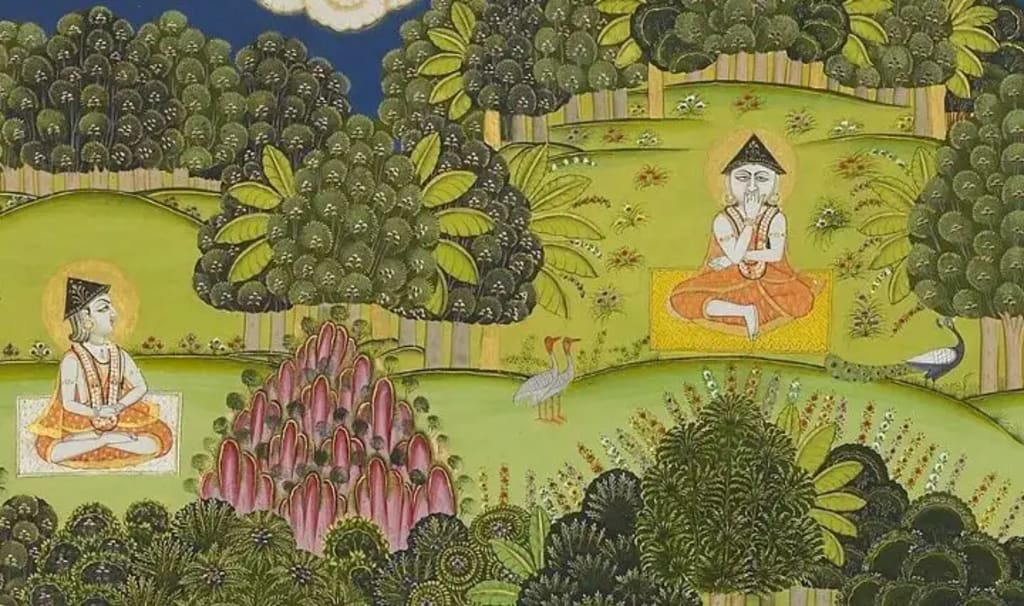
Greetings! I often joke with my friends that “Darshan ke bina to Duniya Adhuri he” (The world is incomplete without Darshan (Philosophy)). Philosophy or Darshan is defined as “the study of the fundamental nature of knowledge, reality, and existence.” I know I want to spend my life in the arms of philosophical knowledge the moment I read Socrates and Plato. Western philosophy throughout the ages have a deep impact on shaping society. From Plato to Marx and from Aristotle to St. Augustine many philosophers have contributed widely to this rich field through their arguments and reasons. However, it pains me to say that despite living in India, I was in ignorance for a long. Apart from “Bhagavad Gita”, I was not able to study and deliberate the richness of Indian Philosophy, which has contributed largely to the civilizational development of this country. I guess there is never too late. Right?
Recently I have started reading Indian Philosophy in deep. It literally gives me chills every time I discuss it with someone. While reading it I also understand one thing unlike western philosophy, Indian philosophy is not easy to understand by a general audience. The complexities are mostly due to preconceived notions and impulsive thinking patterns vi-à-vis questions of epistemology.
There are nine schools of Indian Philosophy. Out of these six schools are Astika (Orthodox) and three schools are Nastilka (Heterodox). Here I’m starting a new series in which, every week I’ll be discussing one school of Indian Philosophy in detail. I’ll read the available literature and will try to summarize everything for you in simple language.
We as Indians have a very rich heritage and legacy, we should not let the communication gap hinder the flow of our ancient wisdom and knowledge. I’ll take modern examples and try to make this as simple as possible.
Introduction to Indian Philosophy:
What distinguishes Indian Philosophy from its western counterparts is that every new western philosophy replaced or in a way succeeded its predecessors, whereas in Indian Philosophy there is a concept of tolerance and collective acceptance, a person can have faith in “Yoga” philosophy at the same time he can be a staunch believer of “Vedanta” philosophy; unlike In western philosophy in which you can either be Aristotelian or be Platonic. Interesting right? Let’s ponder over it.
As I mentioned earlier there are nine schools of Indian Philosophy, of these 6 are Astikas and 3 are Nastikas. Do not confuse yourself with modern definitions of Astika and Nastika, it has nothing to do with religion or god. As per Indian Philosophy Astikas are the ones who believe in the authority of the Vedas, on the other hand, Nastikas are the ones who do not believe in the authority of the Vedas. (The Vedas are a collection of religious/philosophical/ritualistic texts that originated in ancient India. )
Astika or Orthodox Philosophies are:
1. Sankya
2. Yoga
3. Nyaya
4. Vaisesika
5. Mimansa (AKA Purva Mimamnsa)
6. Vedanta (AKA Uttar Mimansa)
In this, Vedanta and Mimansa are directly based on the Vedic text and the remaining four are (somehow connected to Vedas but) are based on independent grounds.
Nastika or Heterodox Philosophies are:
1. Charvaka
2. Buddha
3. Jaina
As I already put it, Nastika does not mean denial of the existence of God but denial of the authority of Vedas. So Jaina and Budhha are theists but also Nastika.
Any philosophy whether Indian or western has Epistemology (theory of Knowledge), Metaphysics (Understanding of man, nature, and God), Logic, and Ethics. In the following weeks, we will explore all of these aspects of Indian philosophy in deep.
Stay tuned.
About the Creator
Darshan
Political Science, National Security, International Relations and Philosophy





Comments
There are no comments for this story
Be the first to respond and start the conversation.